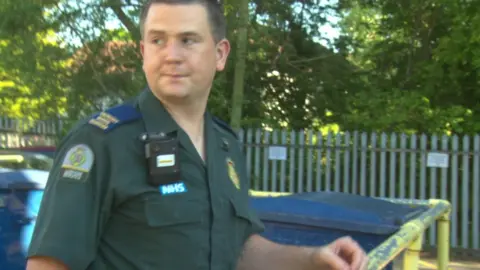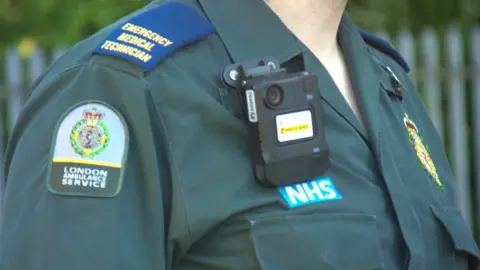Bodycams for ambulance staff after rise in attacks
 BBC
BBCAmbulance workers in England will be given body-worn cameras, after assaults against them went up by almost a third in five years.
More than 3,500 attacks on emergency care staff were recorded last year.
The move was welcomed by staff trialling the cameras, some of whom had experienced violence on the job.
The NHS is expecting to make the equipment available to all 10 of England's ambulance trusts by the end of the month.
Gary Watson, who took part in the trial in the London Ambulance Service, was assaulted by a drunk patient in 2018, along with three of his colleagues.
He tore ligaments, damaged his shoulder and received serious injuries to his face and neck.
Mr Watson believes the cameras could act as a deterrent. And, he said, if he'd had one when he was attacked three years ago, it would have saved him the stress of testifying against his attacker in court.
"Every time a job comes on the radio you think, 'Is it going to be another one of those jobs?' You just never know.
"All four members of staff got up for work that morning to help people - come in, do their job, care for people and then go home to their families. They didn't come in to... be hospitalised and end up with the after-effects of such violence," he said.
"When you see someone in uniform, you see the uniform, but obviously there's a person who is wearing it."

Chief people officer for NHS England Prerana Isaar said: "Every member of our dedicated and hardworking NHS staff has the fundamental right to be safe at work and it is our priority to eliminate violence and abuse, which we will not tolerate."
A law passed in 2018 gave judges the power to hand down more severe sentences to people who assault emergency workers on duty.
NHS England said the camera would start recording at the touch of a button, if members of the public became aggressive or abusive. Recordings can then be shared with the police, and used in court as evidence.
NHS England medical director Steve Powis, said: "Initial trial findings show the cameras make staff feel safer, and can assist in de-escalating situations where staff are faced with someone being aggressive towards them."
But in the North East Ambulance Service - one of the pilot areas along with the London Ambulance Service - assaults actually increased.
The cameras were only trialled with small numbers of people, though.
Health minister Nadine Dorries said the trial of the cameras helped to reduce incidents.
She added: "We have already doubled the maximum sentence for assaulting an emergency worker and continue to take action to protect staff against violence, aggression and discrimination."
Ambulance services in Wales and Northern Ireland both said they were considering introducing body cameras for staff.
The Scottish ambulance service declined to comment.
